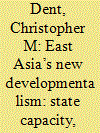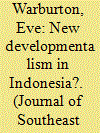|
|
|
Sort Order |
|
|
|
Items / Page
|
|
|
|
|
|
|
| Srl | Item |
| 1 |
ID:
159403


|
|
|
|
|
| Summary/Abstract |
This paper argues that to understand the relevance of developmental states in East Asia and elsewhere, we need to focus on the changing development agenda in the early twenty-first century, especially how this connects with the global challenge of climate change and thereby sustainable, low-carbon development. It combines theories on state capacity and ecological modernisation to form the ‘new developmentalism’ concept. This is applied to study revitalised and refocused forms of state capacity aimed at realising the transformative economic objectives associated with sustainable development. New developmentalism helps us understand not only current state capacity practice in a climate challenged world but also how we have moved beyond original conceptions of developmental statism. It may be understood in the wider context of the sustainable development agenda and climate interventionism. As is argued, new developmentalism is most clearly evident in East Asia but can be applied in a wider geographic sense where strong forms of developmental state capacity are exercised towards meeting transformative sustainable development goals.
|
|
|
|
|
|
|
|
|
|
|
|
|
|
|
|
| 2 |
ID:
162532


|
|
|
|
|
| Summary/Abstract |
Over the course of the past decade, Indonesia’s economic planning has become increasingly developmentalist in orientation. While aspects of this model have deep roots in the country’s history, a more self-conscious developmentalist agenda re-emerged during President Susilo Bambang Yudhoyono’s second term in office (2009–14). This paper suggests that under President Joko Widodo a new developmentalism has crystallized further and, arguably, become a defining feature of Indonesia’s political economy. To advance this argument, the paper draws upon studies of the “new developmentalism” in middle-income and emerging economies. This new developmentalism is characterized by a normative commitment to an activist state that can engineer fast economic growth, direct industrial upgrading, and ensure economic redistribution. However, developmental agendas should be distinguished from developmental outcomes. For Indonesia, state-led programmes for industrialization and inclusive economic growth have often fallen short. This study highlights some structural constraints upon the new developmentalism, with a particular focus upon politics. Specifically, it identifies patronage and clientelism as fundamental challenges to an effective state-led developmental model. Successive Indonesian governments, Jokowi’s included, have taken a conservative approach to the political problems that undermine their developmental goals.
|
|
|
|
|
|
|
|
|
|
|
|
|
|
|
|
| 3 |
ID:
159395


|
|
|
|
|
| Summary/Abstract |
Reviewing decades of thinking regarding the role of the state in economic development, we argue for the continued relevance of the concept of the ‘developmental state’. With reference to Argentina, Brazil, Ethiopia, Rwanda and China, we contend that new developmental states are evidence of a move beyond the historical experience of East Asian development. Further, we argue for the applicability of the developmental state framework to key questions of governance, institution building, industrial policy and the extractive industries, as well as to a wide variety of cases of successful and failed state-led development in the early twenty-first century.
|
|
|
|
|
|
|
|
|
|
|
|
|
|
|
|
|
|
|
|
|